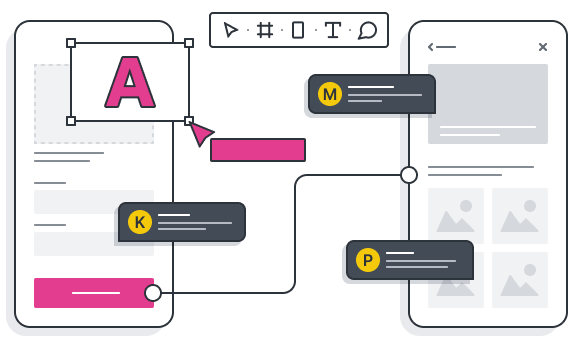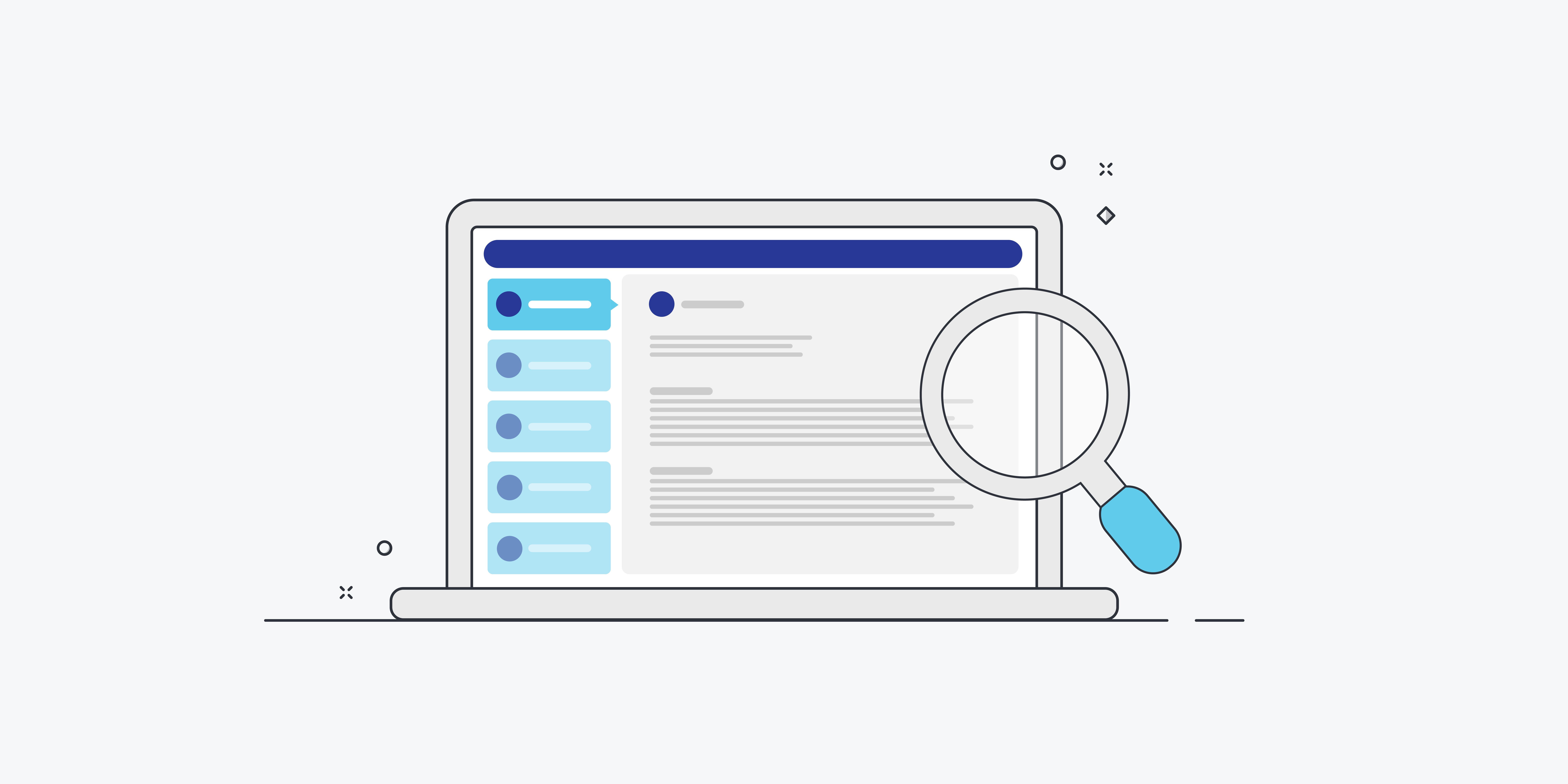Pursuing a career in UX research promises more than just a good salary and flexible working; it’s a pathway to a fulfilling and multi-faceted long-term profession. As businesses increasingly prioritise user experience, the demand for skilled UX researchers is on the rise.
If you’re looking to land your first UX researcher job, you’re in the right place! We’re here to guide you through the job hunt, providing you with the tools and knowledge to climb the UX research career ladder with confidence.
Let’s get started.
What does a UX researcher do?
UX research is a multi-disciplinary role that involves a seamless blend of UX strategy, research, project management, and analysis. In short, UX researchers actively shape the blueprint of a user’s interaction with a product.
UX researchers work hand in hand with product managers, designers, and engineers. They ensure that every perspective aligns with the user’s needs, keeping the team’s vision user-centred. Their toolkit is vast, including advanced analytics and user testing software, which they use to capture and dissect user behaviour with precision.
A UX researcher also thrives on communication, turning data into stories that propel product teams to innovate. They share these insights with clarity and conviction, often swaying product decisions and strategies. Keeping their fingers on the pulse of the tech industry is part of their DNA, ensuring that the products they work on stay ahead of the curve and deeply connected to user needs.
On a day-to-day basis, UX researchers might find themselves:
- Identifying research questions based on what the team needs to know about user behaviour and preferences.
- Designing and conducting studies through user interviews, surveys, and usability tests to gather user data.
- Analysing user feedback to uncover user needs, pain points, and behaviours.
- Communicating insights and presenting findings to key stakeholders to inform product decisions.
- Creating user personas and journey maps that represent different user groups and their interactions with the product.
To learn more about the role, check out our comprehensive guide to what a UX researcher does.
Is there a high demand for UX researchers?
It’s no secret that the tech job market has seen its ups and downs in recent years, so before diving headfirst into your job hunt, you might be tentatively wondering how high the demand for UX researchers actually is—and how that might impact your ability to land a UX researcher job in a timely way.
Luckily, the numbers paint a promising picture. The US Bureau of Labor Statistics projects a robust 8% growth rate in UX roles. This isn’t just a number—it’s a beacon signalling that UX research is a field ripe with opportunity.
Companies across industries are waking up to the fact that good UX is no longer a luxury; it’s the heartbeat of a thriving business—the golden ticket to customer loyalty and a booming brand. In this new digital landscape, UX researchers have become indispensable hires.
And this demand doesn’t go unrewarded. In Ireland, the average salary for a UX researcher is just over €60,000 per year and goes over €92,500 per year with seniority. (Glassdoor).
In the US, a UX researcher’s salary averages $100,688, which can soar up to $130,000+ as you climb the seniority ladder (according to Glassdoor).
So, is now a good time to step onto the UX research career path? Absolutely! As technology evolves, demand has never been higher for talented UX researchers who can help shape a future where technology is not only functional—but also a joy to use.
How to get a UX researcher job with no experience
Breaking into the world of UX research without prior experience might feel like a daunting task, but UX research—like many UX disciplines—has the winning combination of a low barrier to entry and high rewards.
The first step? Take a deep dive into the world of UX. As a complete beginner, you can learn to think like a UX researcher with a comprehensive course like the UX Design Institute’s Professional Certificate in User Research. This isn’t just about earning a certificate to hang on your wall—it’s about absorbing the essence of UX research, from user psychology to data analysis—and learning the practical skills you’ll need to work as a UX researcher.
Next, it’s time to transform your newfound knowledge into tangible proof of your skills. This involves building a portfolio that tells the story of your journey into UX research, with case studies and projects that spotlight your skill in turning user feedback into actionable insights. Luckily, courses like the UXDI Certificate in User Research allow you to build a professional portfolio with real-world projects under the guidance of leading UX researchers.
Remember, employers aren’t just scouting for experience—they’re on the lookout for passion, curiosity, and a knack for innovation. Show them what you’re made of with a portfolio that dazzles, a qualification that backs up your expertise, and a narrative that demonstrates you’re ready to take on the UX research world by storm.
How to find a UX researcher job in 2024: 7 Actionable job search tips
Whether you’re a recent graduate or shifting careers, high demand for UX researchers means there’s no shortage of jobs to go around—from startup roles to positions in larger enterprises. But how do you actually go about finding UX researcher jobs?
In this section, we’ll lay out some practical, actionable tips for landing that first role and getting your foot firmly on the UX research career ladder.
Network like a pro
The key to unlocking the hidden UX research job market is networking. Start attending UX meetups, workshops, and design sprints to rub elbows with the movers and shakers in the field.
Online platforms like LinkedIn are your ally—reach out for informational interviews, and don’t be shy about asking for introductions. Remember, it’s not just about meeting people; it’s about building relationships. You never know where your next UX researcher job might come from!
Develop a personal brand
Your online persona is your billboard in the digital world. Craft a LinkedIn profile and a portfolio that both showcase your passion for UX research, speak to your skills, and tell your unique career story. Be consistent across platforms, and let your personal brand reflect your unique approach to UX research.
Engage with the community
The UX community is one of the most active communities in the world. Don’t be afraid to get involved! Start contributing to UX discussions on Twitter/X, join Slack groups, participate in subreddit threads, and check out these 12 UX communities that are ready to welcome you.
Share your projects, give feedback to others, and keep the conversation going. An active online presence can generate job leads and showcase your enthusiasm for UX research.
Tailor your applications
When it comes to job applications, one size does not fit all. Read job descriptions carefully and echo the language and requirements they list in your cover letter and resume. Show potential employers that you understand their needs and that your skills align perfectly with what they’re looking for.
Keep your skills topped up
In the fast-paced world of UX research, staying updated with the latest research methods, design software, and best practices is crucial. Attend webinars, take online courses, and read industry blogs to ensure your toolkit is up-to-date and ready to impress.
Be proactive
Don’t wait for opportunities to come knocking. Volunteer to do research projects for local businesses, collaborate on open-source projects or conduct your own user research studies. A proactive approach not only builds your portfolio but also demonstrates your dedication and initiative to potential employers.
Stay prepared for interviews
Interviews can be daunting, but preparation is key. Familiarise yourself with common interview questions for UX researchers and practice articulating your thought process and decisions. Use stories from your past experiences to illustrate how you’ve applied UX research methods effectively. That way, you avoid panicking when opportunities arise!
The best job boards for finding UX researcher jobs
On your journey to landing a UX researcher job, think of job boards as your compass. These boards are not just platforms for job listings; they’re communities where opportunities, insights, and resources converge to help you navigate this exciting career change.
To streamline your search, here’s our roundup of the best job boards for finding a UX researcher job:
- LinkedIn: The professional networking giant’s job board has advanced search capabilities to filter for UX roles.
- Indeed: Renowned for its extensive database, Indeed aggregates listings from numerous sources, offering a wide range of UX research positions.
- Glassdoor: Beyond job listings, Glassdoor provides valuable company reviews and salary data, giving you a sneak peek into potential employers.
- UX Jobs Board: A hub of UX talent, this board specialises in roles from junior positions to senior-level opportunities.
- UI UX Designer Jobs: A manually curated job board for UI/UX Designers. Sign up to receive weekly emails for remote jobs in USA, Canada and EU..
- Smashing Magazine Jobs: Catering to the creative and web professional community, Smashing Magazine’s job board is a hotspot for design-centric roles, including UX research.
- IxDA Job Board: The Interaction Design Association curates a list of quality UX positions, focusing on the community’s growth and networking.
- We Work Remotely: Boasting as the largest remote work community, this platform is perfect for UX researchers who prefer remote work. With an advanced filtering system, it provides job listings across the globe.
- Remote OK: Another great resource for finding remote UX positions, appealing to those looking to work from anywhere.
- Authentic Jobs: A trusted job board for the creative industry, offering a wide range of UX and design roles (including UX research).
Leveraging these job boards effectively means engaging with the communities, setting up job alerts, and tailoring applications to each role. Each application is a step closer to your goal, and these job boards are your allies in the quest for your first UX researcher gig.
Learn more about building a career as a UX researcher
UX research is a flourishing and lucrative discipline that marries technology, psychology, and design—no wonder it’s such a popular choice for career changers.
Hopefully, you now feel better equipped to navigate finding your first UX researcher job, from understanding the demand for UX roles to leveraging job boards and networking to uncover those hidden gem positions.
While pursuing a UX researcher job might seem overwhelming, the bold leap into the unknown can lead to the most rewarding outcomes. Just take it from Azeem, whose transition from business analytics to UX research is nothing short of inspiring. We encourage you to delve into Azeem’s story on our blog, where you’ll see how upskilling and a dash of perseverance can launch you into your dream role in UX.
You might also like to watch our UX Insiders episode on getting hired in UX:




